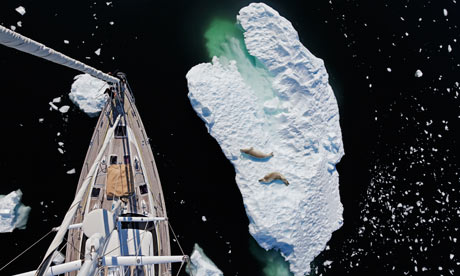
Monday, August 20, 2012
Rate of Arctic Summer sea loss higher than expected
Sea ice in the Arctic is disappearing at a far greater rate than previously expected, according to data from the first purpose-built satellite launched to study the thickness of the Earth's polar caps. Preliminary results from the European Space Agency's CryoSat-2 probe stated that 900 cubic kilometres of this summers sea ice has disappeared from the Arctic ocean over the past year. This rate of loss is 50% higher than most scenarios polar scientists had predicted. Global warming is so far, the most popular suggested cause. Rising greenhouse gas emissions is starting to have a major impact on this Arctic region. The loss of the Arctic ice coverage could be very severe. Without the caps radiant, white glare, sun can't be reflected back into space. This means the region will heat up even more than it's supposed to. This means ocean temperatures will rise and methane deposits on the ocean floor will more than likely melt. The Arctic is particularly vulnerable when it comes to the impact of global warming. The weather systems of the planet all work together so what happens in one place, affects us all.


Subscribe to:
Post Comments (Atom)
I knew that the ice caps were melting but i didn't know how drastically they were! 900 cubic kilometers is a lot of sea ice to have disappeared. I am sort of confused with with the statement about greenhouse gas emissions, but that may be because of my lack of knowledge about global warming. I completely agree that changes in the arctic will affect the entire world. Everything is connected.
ReplyDeleteDo you have any suggestions on how we could decrease the amount of greenhouse gases that are being released into the atmosphere that are helping cause the disapperance of sea ice in the Arctic?
ReplyDeleteIts hard to grasp the effects of global warming from the United States, where the only result we see a small increase in temperature every year. Maybe, we should try living on ice and watch our homes melt away, then we might recognize the severity of global warming and fight to reduce the amount of greenhouse gases released into the atmosphere.
ReplyDelete